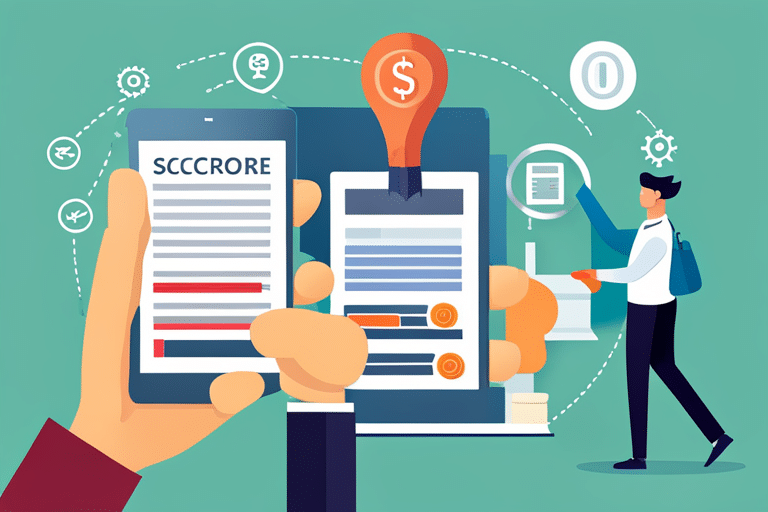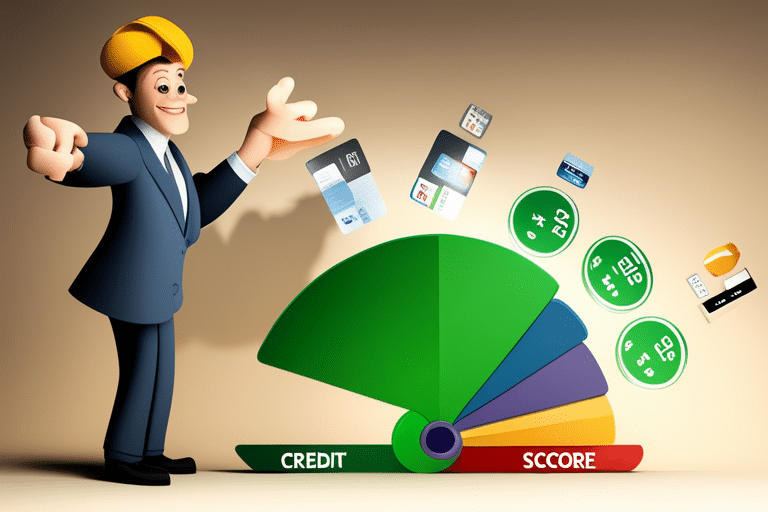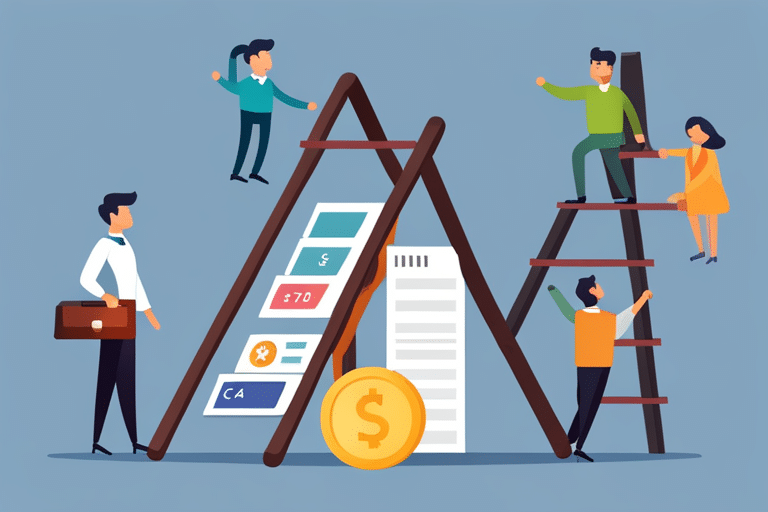Imagine you’re a tightrope walker, delicately balancing your financial future. The relationship between debt management and credit scores is like the delicate balance beam beneath your feet.
One wrong move could send you plummeting into a world of missed opportunities and limited choices. But fear not!
In this article, we’ll guide you through effective debt management strategies that will keep you steady on the highwire of credit scores.
So grab your safety net and let’s dive in!
Key Takeaways
- Effective debt management techniques can improve credit scores
- Timely payments and low credit utilization ratios positively impact credit scores
- Debt consolidation can simplify payments and potentially lower interest rates
- Consistency in budgeting and debt management strategies is crucial for long-term success
Understanding Debt Management Strategies
 ” style=”max-width: 100%; height: auto;”>
” style=”max-width: 100%; height: auto;”>Understanding debt management strategies is essential for improving credit scores. So, you want to know how to tackle that pesky debt and boost your credit score? Well, my friend, you’ve come to the right place! Let’s dive into some debt management tips and strategies that will have those numbers looking oh-so-pretty on your credit report.
First things first, it’s important to create a budget. Yes, I know budgets can be boring, but trust me, they are your secret weapon in the battle against debt. Take a good hard look at your income and expenses and figure out where you can cut back. Maybe skip that daily latte or cancel that streaming service you never use (I’m looking at you, gym membership!). Every little bit counts!
Next up, prioritize your debts. Make a list of all the money you owe and sort them by interest rate. Pay off those high-interest debts first while making minimum payments on the rest. This way, you’ll save money in interest over time.
Lastly, don’t be afraid to reach out for help if you need it. There are plenty of professional organizations and financial advisors who specialize in helping people manage their debts effectively.
Importance of Credit Scores in Debt Management

The significance of credit scores in managing debts is often underestimated. People tend to focus on their debt management strategies without realizing that their credit score plays a crucial role in the process. Think of your credit score as your financial report card – it reflects how responsible you are with borrowing money and paying it back. A good credit score can open doors for better interest rates, higher loan amounts, and more favorable terms. On the other hand, a poor credit score can limit your options and make it harder to get approved for loans or credit cards.
To truly grasp the importance of credit scores in debt management, let’s take a look at this handy table:
| Debt Management Strategy | Credit Score Importance |
|---|---|
| Paying bills on time | High |
| Keeping credit utilization low | High |
| Avoiding unnecessary debt | Moderate |
| Regularly checking your credit report | Moderate |
| Limiting new credit applications | Low |
As you can see, certain debt management strategies have a greater impact on your credit score than others. By prioritizing actions that positively affect your credit score, such as paying bills on time and keeping your utilization low, you’re not only improving your financial health but also increasing your chances of getting better deals when borrowing money.
Impact of Debt Management on Credit Scores

Hey there! So you want to know all about debt management techniques and how they can improve your credit score, huh? Well, you’ve come to the right place!
In this discussion, we’ll dive into some awesome strategies that can help you tackle your debt while also giving your credit score a nice little boost.
Trust me, by the end of this, you’ll be feeling like a financial superhero ready to conquer any money challenge that comes your way!
Debt Management Techniques
To improve your credit score, you should consider utilizing effective debt management techniques. You might be wondering, what are these magical techniques? Well, fear not! I’ve got you covered with some handy tips and tricks:
-
Debt Repayment: Start by tackling those pesky debts head-on. Make a plan to pay off your outstanding balances systematically. It may take time and effort, but trust me, it’ll be worth it in the long run.
-
Debt Consolidation: If you’re juggling multiple loans or credit cards, consolidating them into one manageable payment can be a game-changer. Not only will it simplify your financial life, but it may also save you money on interest rates.
-
Budgeting: Ahh, the good ol’ B-word. Creating a realistic budget and sticking to it is crucial for successful debt management. Keep track of your income and expenses, prioritize essential payments, and cut back on unnecessary spending.
Credit Score Improvement
Don’t underestimate the power of consistent financial habits when it comes to boosting your credit score. Your credit score is like a report card for your financial life, and just like in school, good habits can lead to great results.
One of the key factors that affects your credit score is your payment history. Making all of your payments on time shows lenders that you are reliable and responsible.
Another important factor is how much debt you have compared to your available credit, also known as your credit utilization ratio. Keeping this ratio low by not maxing out your credit cards can help improve your score.
Regularly monitoring your credit score can also be helpful in identifying any errors or fraudulent activity that could be negatively impacting you.
So, keep those good financial habits going and watch as your credit score starts to climb!
Speaking of climbing, let’s now dive into some effective debt management techniques that will help you conquer those debts once and for all.
Effective Debt Management Techniques

One effective debt management technique is to create a budget and stick to it. Sticking to a budget can be as challenging as resisting the temptation of that extra slice of pizza. But hey, if you want to master the art of debt management, you’ve got to buckle down and get serious.
Here are three strategies that will help you tackle your debts like a boss:
-
Prioritize Your Payments: Start by listing all your debts and their interest rates. Then, focus on paying off high-interest debts first while making minimum payments on the rest. This way, you’ll save money in the long run.
-
Snowball Method: Ever made a snowball? Well, this strategy follows a similar concept. Pay off your smallest debt first while making minimum payments on other debts. Once that’s done, take the amount you were paying towards the smallest debt and apply it towards the next one. As your victories pile up, so will your motivation!
-
Watch That Credit Utilization Ratio: Your credit utilization ratio is like wearing socks with sandals – not cool! Aim to keep it below 30% by paying down outstanding balances or increasing your credit limits.
By implementing these strategies into your debt management plan, you’ll be well on your way to financial freedom in no time! Speaking of which…
Next up: let’s dive into how debt consolidation affects credit scores. Trust me; it’s an interesting topic worth exploring!
How Debt Consolidation Affects Credit Scores

So, you’ve learned some effective debt management techniques and you’re ready to take your credit score to the next level. Well, buckle up because we’re about to dive into how debt consolidation can impact your credit score.
First things first, let’s talk about the benefits of debt consolidation. It’s like a superhero swooping in to save the day! By combining all your debts into one loan or payment plan, you can simplify your financial life and potentially lower your interest rates. Plus, it can help you stay organized and focused on paying off that pesky debt.
Now, onto the juicy part – how does this affect your credit score? Well, here’s the lowdown: initially, it may cause a slight dip in your score. Don’t panic! This is just temporary as lenders see it as taking on new credit. But fear not my friend because as you make regular payments and show responsible behavior with your consolidated loan, that dip will turn into an upward trend.
In fact, over time, consolidating your debts and consistently making payments can actually improve your credit score. It shows lenders that you’re being proactive about managing your finances and reduces the risk of defaulting on any loans.
Balancing Debt Management and Credit Card Usage

To maintain a healthy financial situation, it’s important to find the right balance between managing your debts and using your credit cards responsibly. Life can be like walking on a tightrope, trying to navigate through the world of debt and credit. But fear not, my friend! I’m here to guide you through this balancing act with some tips and tricks.
Let’s start with credit utilization. It’s all about finding that sweet spot – not too high, not too low. Aim for a utilization rate of around 30%. This means if you have a credit limit of $1,000, try to keep your outstanding balance at around $300. Balancing credit utilization shows lenders that you’re responsible and capable of handling your debts.
Next up, debt repayment strategies! You’ve got options: snowball method, avalanche method, or even creating your own unique strategy. The snowball method is like building a snowman – start by paying off the smallest debts first and work your way up. The avalanche method is like an unstoppable force – tackle the highest interest debts first and watch them crumble.
Long-Term Effects of Debt Management on Credit Scores

Finding the right balance between effectively managing your debt and using credit responsibly can have long-term effects on your credit score. It’s like walking a tightrope, my friend. One wrong step and poof, there goes your good credit standing.
Let’s talk about credit utilization first. This fancy term refers to how much of your available credit you’re actually using. The lower, the better! Keeping it below 30% is ideal, but if you can go even lower, kudos to you!
Now, let’s dive into the magical world of credit counseling. Think of it as having a wise mentor who guides you through the treacherous waters of debt management. These experts will help you create a budget, negotiate with creditors, and come up with a plan to pay off your debts faster than a cheetah chasing its prey.
Remember, my friend, Rome wasn’t built in a day (or paid off in one either). Consistency is key! Stick to your debt management plan and watch those numbers on your credit score climb higher and higher.
Frequently Asked Questions
Can Debt Management Strategies Improve My Credit Score in a Short Period of Time?
Sure, tackling debt can give your credit score a boost. By managing your debts wisely and making payments on time, you’ll show lenders that you’re responsible and reliable. It’s like giving your credit score a little makeover!
Is It Possible for Debt Management Techniques to Completely Eliminate My Debt?
Sure, debt management techniques can definitely help you eliminate your debt over time. They provide long-term solutions and various benefits like lower interest rates and structured repayment plans. Don’t worry, you got this!
How Do Credit Scores Affect My Ability to Qualify for New Credit During a Debt Management Program?
When it comes to qualifying for new credit during a debt management program, your credit score has a big impact. It can determine whether lenders see you as a trustworthy borrower or not.
Can Debt Consolidation Negatively Impact My Credit Score?
Debt consolidation can temporarily boost your credit score by reducing your overall debt. However, it’s important to remember that this is just a short-term improvement. Long-term credit improvement depends on responsible debt management and consistent payments.
What Factors Should I Consider When Deciding to Use Credit Cards While in a Debt Management Program?
Before swiping that plastic, consider how it affects your debt management program. Factors like interest rates, payment history, and credit utilization play a role. So be savvy and choose wisely!
Conclusion
So there you have it, my friend! The relationship between debt management and credit scores is as tight as peanut butter and jelly.
It’s like a dance party where one wrong move can mess up your groove. But fear not, because effective debt management techniques can help you boogie your way to a better credit score.
Just remember to balance your debt payments with smart credit card usage, and watch out for the long-term effects of your debt management decisions.
After all, Rome wasn’t built in a day! So keep on hustlin’ and bustlin’, and soon enough, you’ll be strutting with the best of them!

